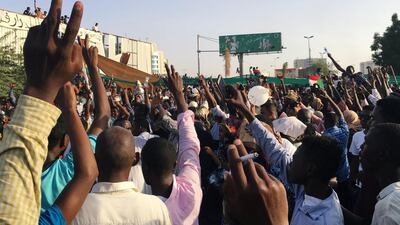Sudanese security forces fired teargas at thousands of anti-government protesters demonstrating outside the army headquarters in Khartoum on Tuesday, with gunshots also heard at the military complex.
Witnesses said members of the powerful National Intelligence and Security Service and riot police fired teargas in a bid to disperse the crowd, as protesters sat in for a third night.
Thousands of defiant Sudanese protesters remained camped outside army headquarters for a fourth day on Tuesday, buoyed by the abandonment of the pre-dawn attempt to disperse them after soldiers intervened, witnesses said.
Chanting "freedom, freedom," crowds of men and women, who had spent the night camped outside sprawling the Khartoum complex that also houses the president's residence, urged top brass to back them in ending Omar Al Bashir's three decades of iron-fisted rule.
The demonstrations were initially a response to the rising cost of living, but have evolved into calls for President Omar Al Bashir to resign.
"The security officers are firing teargas. I can see protesters coughing and covering their faces with hands and medical masks," a witness said from near the site of the demonstration.
"I can also hear gunshots, but it's unclear who is firing."
A protester at the army headquarters also confirmed hearing gunshots but was unable to determine who was firing.
Army soldiers on armoured vehicles were guarding the presidential palace but not moving against demonstrators.
Since December 19, Sudan has been rocked by persistent protests sparked by the government's attempt to raise the price of bread, and by fuel and cash shortages. The demonstrations have developed into the most sustained challenge to Mr Al Bashir's rule since he took power three decades ago.
Mr Bashir, a former paratrooper, who is being sought by international prosecutors for alleged war crimes in the country's western Darfur region, has refused to step down and said his opponents need to seek power through the ballot box.
The protests escalated on Saturday, when activists, trying to push the country's armed forces to side with them, marched towards a compound, which houses the defence ministry, Mr Al Bashir's residence and the country's security headquarters. Protesters have been camping at the compound since then.
On Monday, a Sudanese soldier was killed trying to protect the protesters from the security forces. Demonstrators have also staged a sit-in outside the president's residence, with protesters camping there in tents since Saturday.
The government said 31 people have been killed in protest-related violence so far, but Human Rights Watch has put the death toll at 51, including children and medical personnel.
The protests gained momentum last week after Algeria's President Abdelaziz Bouteflika, who was in power for 20 years, stepped down in response to weeks of similar demonstrations.
In February, Mr Al Bashir imposed a nationwide state of emergency to quell the protests after initial efforts failed to rein them in. Mr Al Bashir has introduced tough measures that have led to the arrests of protesters, opposition leaders, activists and journalists.
Since the state of emergency was called, the demonstrations have been confined largely to the capital and its twin city of Omdurman.

